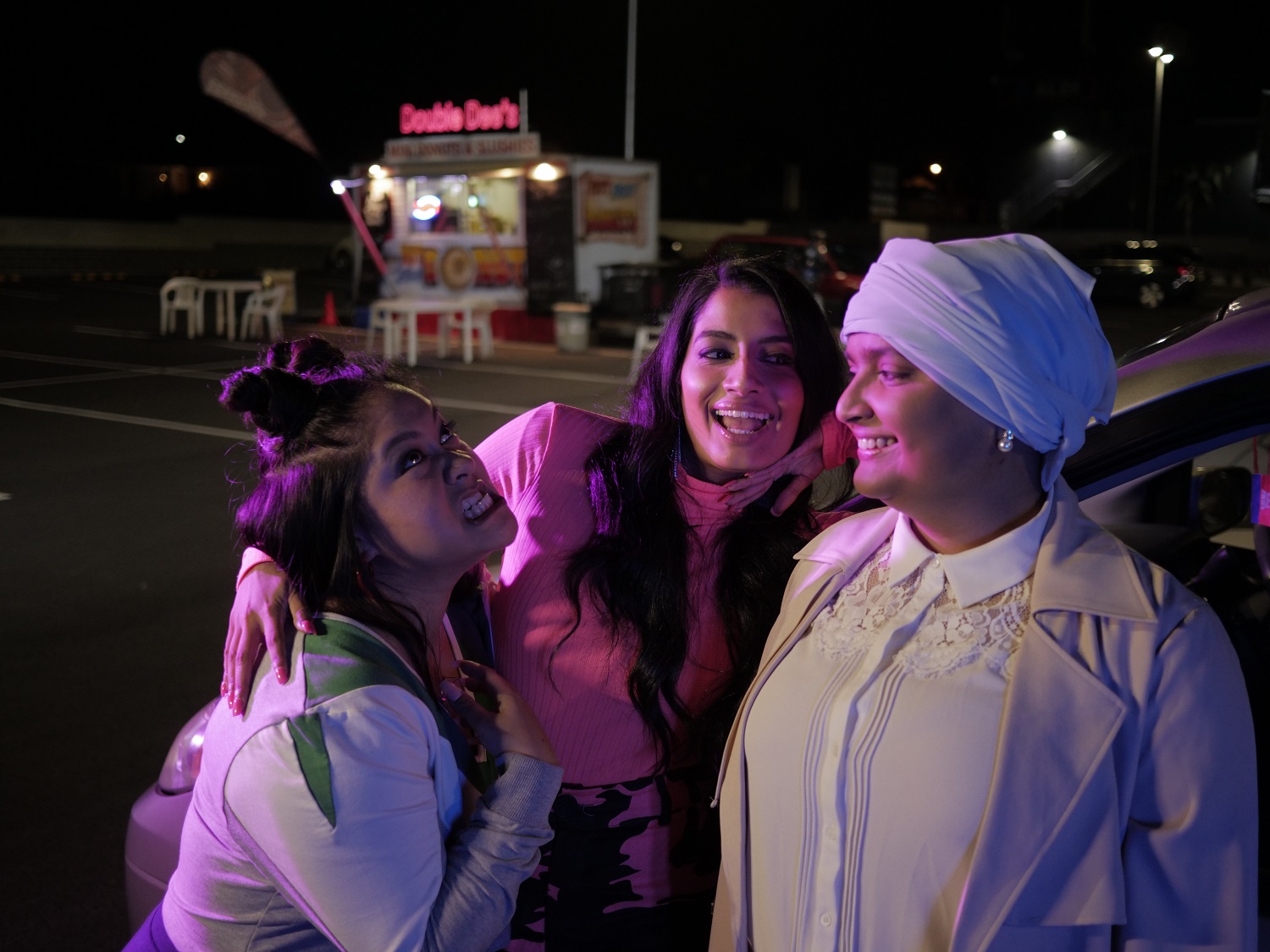
Main Cast Carpark Clubbing: Sophea Op, Monica Kumar and Tasnim Hossain © Carpark Clubbing
Friday night at the club sounds boring to you? Well, you should try carpark clubbing then! That is what the three young women in the hilarious web series Carpark Clubbing did, and it turned out to be a heart-warming story about finding friendship when you least expect it.
Carpark Clubbing is a comedy from Australia with the right sense of humour that will have you laughing out loud. It is honest, authentic, and funny. The show tells the story of three very different young women from Western Sydney, each of them carrying their own baggage. When they meet on a 24h doughnut-shop carpark, a friendship is formed against all odds, growing with every little adventure they stumble into on their nightly carpark sessions. You will find girls, boys, and lots of doughnuts. But ultimately, it is about knowing where you belong and finding your people.
The web series was released in October 2019, had been nominated for the Pilot Light TV Festival in the UK and made it into the official selection of the Melbourne Webfest (both 2020). It was also nominated for die Seriale 2020 and won the award for Best Ensemble Cast. The series convinced the jury with a story that is both funny and profound and a powerful cast whose chemistry created an authentic illustration of friendship and love. It probably helped that the three main actresses Sophea Op, Monica Kumar and Tasnim Hossain wrote the script together. In the following interview, they give some insights on the show and the story they wanted to tell.
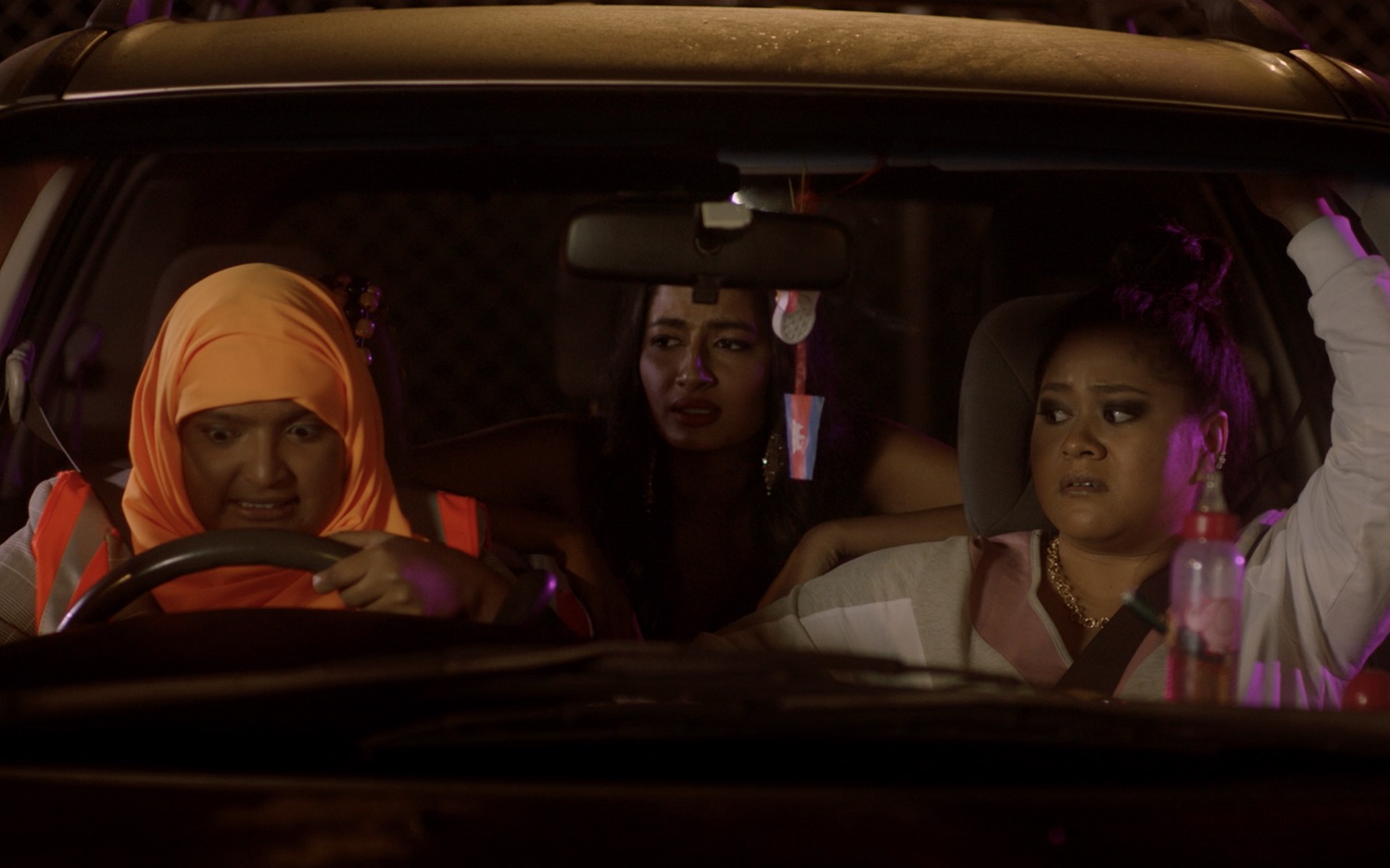
Winner of the Award Best Ensemble Cast at Seriale 2020: Sophea Op, Monica Kumar und Tasnim Hossain © Carpark Clubbing
die Seriale: How did you come up with the story of three young women becoming friends in a carpark? What inspired you to make that series?
Monica Kumar: The series was based on my experiences being a young person, growing up in Western Sydney. Here, there is not a lot of places young people can go out to, and so a lot of people end up hanging out in carparks of 24⁄7 fast food places. It’s this fun, quirky thing that I thought was fascinatingly unique, but also very universal. I wanted to explore the way people make their own fun, even when they don’t have much. The series was also inspired by the lack of representation of working class young Asian people, who are overwhelmingly stereotyped into the “Model Minority Myth”.
Sophea Op: Monica and I met through a youth theatre ensemble a few years ago and after each rehearsal, we would spend hours chatting and just hanging out in my car in her parents’ driveway - we realised that we had spent so much of our late teens and early twenties chilling in and around cars with various friend groups. Monica originally envisaged Carpark Clubbing as a podcast, but when we met Tasnim, the more we spoke about it, the more we realised it was something that had to be visualised with neon lights and a concrete carpark.
Tasnim Hossain: Together we came up with the characters, situations, and storylines. We were inspired by the everyday stories of people in the suburbs who live, work, and play away from the bright lights of city centres.
die Seriale: A carpark is usually a stop on the way from one place to another (e.g. home to grocery store and back). Was the location and the car where the whole show takes place chosen intentionally, especially regarding the nature of a web series, which you often watch on mobile devices in between tasks?
Monica Kumar: Yes, the car and location were chosen intentionally. We wanted to explore the sometimes overwhelming and fraught nature of being a second-generation person, navigating their way into adulthood. Many second-generation people are the first in their family to go to University and often have a lot of external and internal pressure to work hard and be constantly responsible for their family, both financially and emotionally. We wanted to feel like the carpark was a respite from all the pressure these women were facing day to day.
Tasnim Hossain: There’s an international view of Sydney as this bright, sparkling harbour city with beautiful beaches and ocean views; but the reality is that the vast majority of people in Sydney live well outside of those areas, some up to 50 or 60 kms away from the CBD (central business district). Young people in the suburbs often live quite far away from bars, nightclubs, and other places to party and so it’s not unusual for people to hang out in carparks at night-time and make their own fun.
Sophea Op: Monica and I are from south-west Sydney, and there is a massive carpark on Orange Grove Road with a 24-hour doughnut shop and a hot-dog and meat pie shack where young people meet up every Saturday night in modified cars. When you come from a community that doesn’t have anywhere to hangout after grabbing a feed (good meal) with friends, you need to get creative.
die Seriale: Was it your intention from the beginning to let the doughnuts play such a big role or was that something that just happened?
Tasnim Hossain: That was definitely something that just happened! We always knew we wanted it to be set in the carpark of a doughnut shop because it was based on a particular carpark that Monica and Sophea were familiar with. As we got into the scripting process though, the doughnuts ended up taking on more and more prominence to the point where they appeared in two different episode titles. The irony of it was none of us three were particularly into doughnuts before that and then, because of our dietary restrictions, we ended up with prop doughnuts that we hated eating!
Sophea Op: Every friend group had their carpark feed - banh mi, bubble tea, slushies, or snack packs (halal meats and hot chips dredged in garlic sauce, it’s a religious experience). Whatever the meal is, it’s the ritual of a meet up, whether it’s before a crazy night or the end of a long D&M (deep and meaningful, intimate conversation).
die Seriale: Do you think it was easier for you to slip into your roles and make the friendship seem authentic because you wrote the script together? Did you know each other before?
Monica Kumar: We all knew each other before and I think it made the onscreen friendship and writing so much easier and fun!
Tasnim Hossain: All of us have a background in youth theatre, with Monica and Sophea having trained as actors and me having trained as a writer. I think a lot of the chemistry between the three of us as people translated to the three of us as characters.
Sophea Op: We also discovered we each have various tastes in comedy and tried to high light that in each of our characters, which was a lot of fun to play with and gave the show a distinct feel.
die Seriale: The story is based on an idea of one of the cast members. Because of that, are some of the dialogues even improvised somewhat?
Sophea Op: Most of the dialogue for the CC trio was locked in as we were on a tight time limits per episode, but our director, Sarah Bassuioni, allowed us some breathing space to improv reactions every now and then.
Monica Kumar: I think the last line of the show, “I can’t believe you’re the one that has a boyfriend”, was improvised.
Tasnim Hossain: A bit of improvisation was in the second episode, the one where Nashrah is on her date. The actor who plays Pete is an improv legend in the Sydney scene, and so it would have been a waste of his talents to not let him loose. A couple of his more colourful lines when he’s chilling with Sokhey and Bonita were made up on the spot.
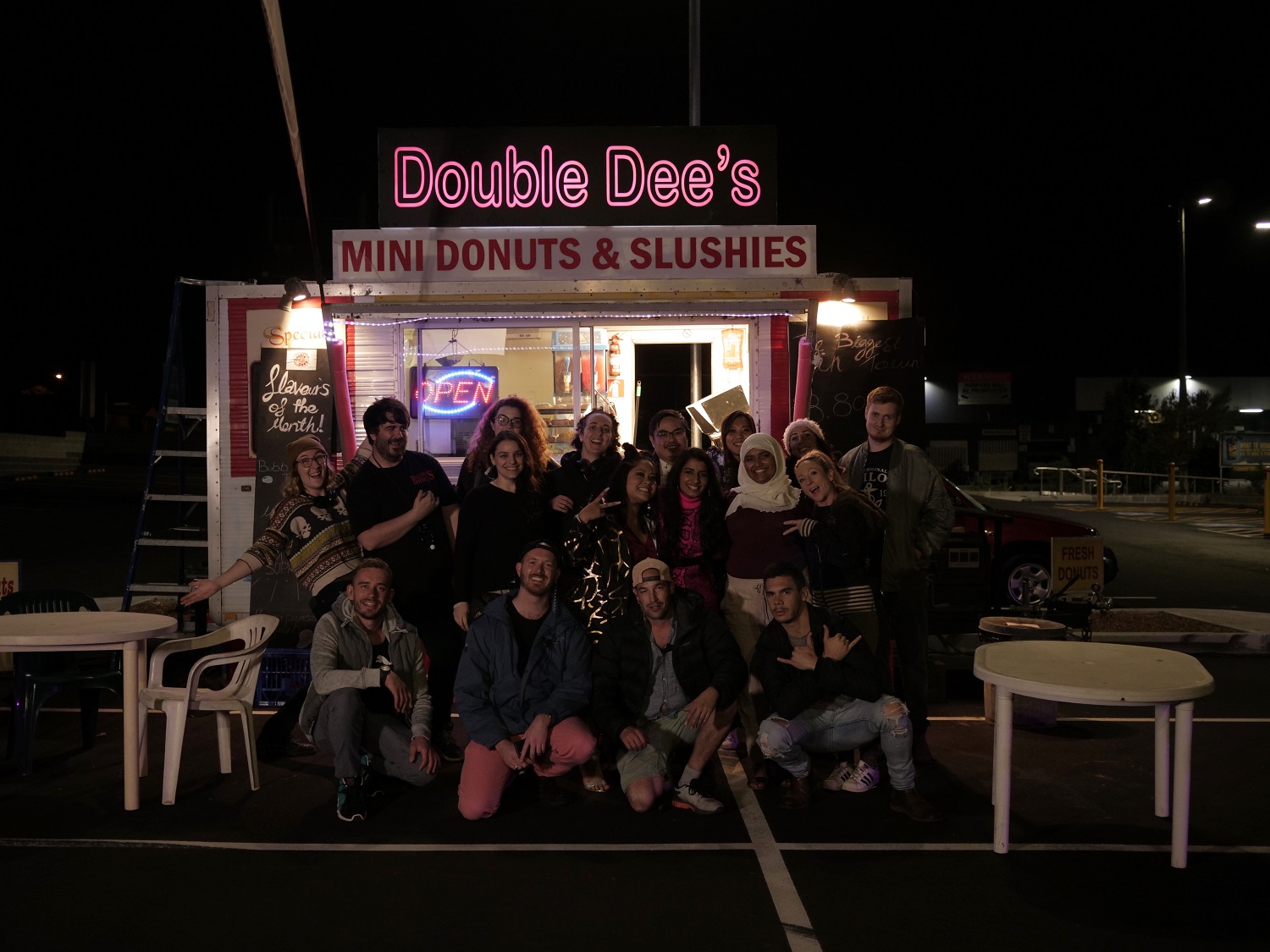
The Crew of Carpark Clubbing © Carpark Clubbing
die Seriale: In order to get the night shots, you sometimes had to film in the middle of the night. What was that like? Do you think because of that it was easier for the cast to get into the “vibe”?
Monica Kumar: For me it was the worst! It was so cold! I think it did help to get into that clubbing vibe, though.
Tasnim Hossain: We filmed some closeups in a blackout tent but every night we filmed until 1 or 2 am. It was easier late at night only because there were fewer people around and so it wasn’t as distracting. We had only closed off a small part of the carpark and so while we were filming there were many people just going about their day, getting their groceries or haircuts, and wondering what we were all doing there!
**Sophea Op: **And our crew’s commitment did not go unnoticed. Sarah Bassuioni’s lighting choices helped set the late-night vibe of the show more than anything. The cast were lit beautifully, and everyone’s skin tones popped off.
die Seriale: Between the three of them, topics like skin colour, ethnic backgrounds, social classes etc. do not matter. However, the series has an undertone that addresses these issues. Why did you choose to make a comedy and address those issues within that funny storyline? Are you afraid the serious aspects of the story are going to be overlooked or do you trust people to get the message? What is the message you wish to give?
Tasnim Hossain: I don’t know that we ever talked overtly about a message, but we did talk about what we wanted to see and what we felt had been missing in the stories we’d previously seen. We wanted to see young women of diverse ethnic heritages existing in a space that was meant for them and where they felt comfortable, so the focus then was just on hanging out and having fun. We wanted to show the diversity of experiences among young women from migrant backgrounds as well. The third episode deals most overtly with tensions around class and privilege, where we see that even though these young women are from outer suburbs and have parents who migrated to Australia, they still have very different opinions and experiences.
**Monica Kumar: **A lot of times when you have characters that are also from a minority background, their entire characterisation is reduced to being about their ethnicity. We were really careful to not do that. To not “other” ourselves in our own show. This show is about three, very different women of colour from Western Sydney, who strike a friendship. The show ultimately is about friendships and solidarity.
In Western Sydney, like other CALD (culturally and linguistically diverse) populated areas, you generally don’t have to explain things about yourself, your family, your religion to your friends because people here already get it. Being a working class, brown woman is seen as normal, ordinary. This show was for that community, and we felt like it would be a disservice to write another old storyline of ethnic women not belonging, when they in fact do.
Sophea Op: People in western Sydney have been friends, stepparents, and in-laws with people from other ethnic backgrounds for decades, and it’s about time mainstream content providers caught up. There is still a wealth gap that is broadening in our part of Sydney that isn’t being addressed by public infrastructure, and the “Model Minority Myth” persists within the Asian community regardless of one’s postcode.
I don’t think any complex issues can be solved within a 9-minute episode of any comedy web series, but I do think it deserves to be told truthfully, which in our case happens to be with a laugh and the characters doing some self-reflection in how they uphold prejudice in their own communities. I don’t know if we necessarily walked into “Carpark Clubbing” with a specific message, other than this is who we are, this is how we exist - we are valid as we are, and we are Australian contrary to whatever postcard you’ve seen that tries to crop us out of frame.
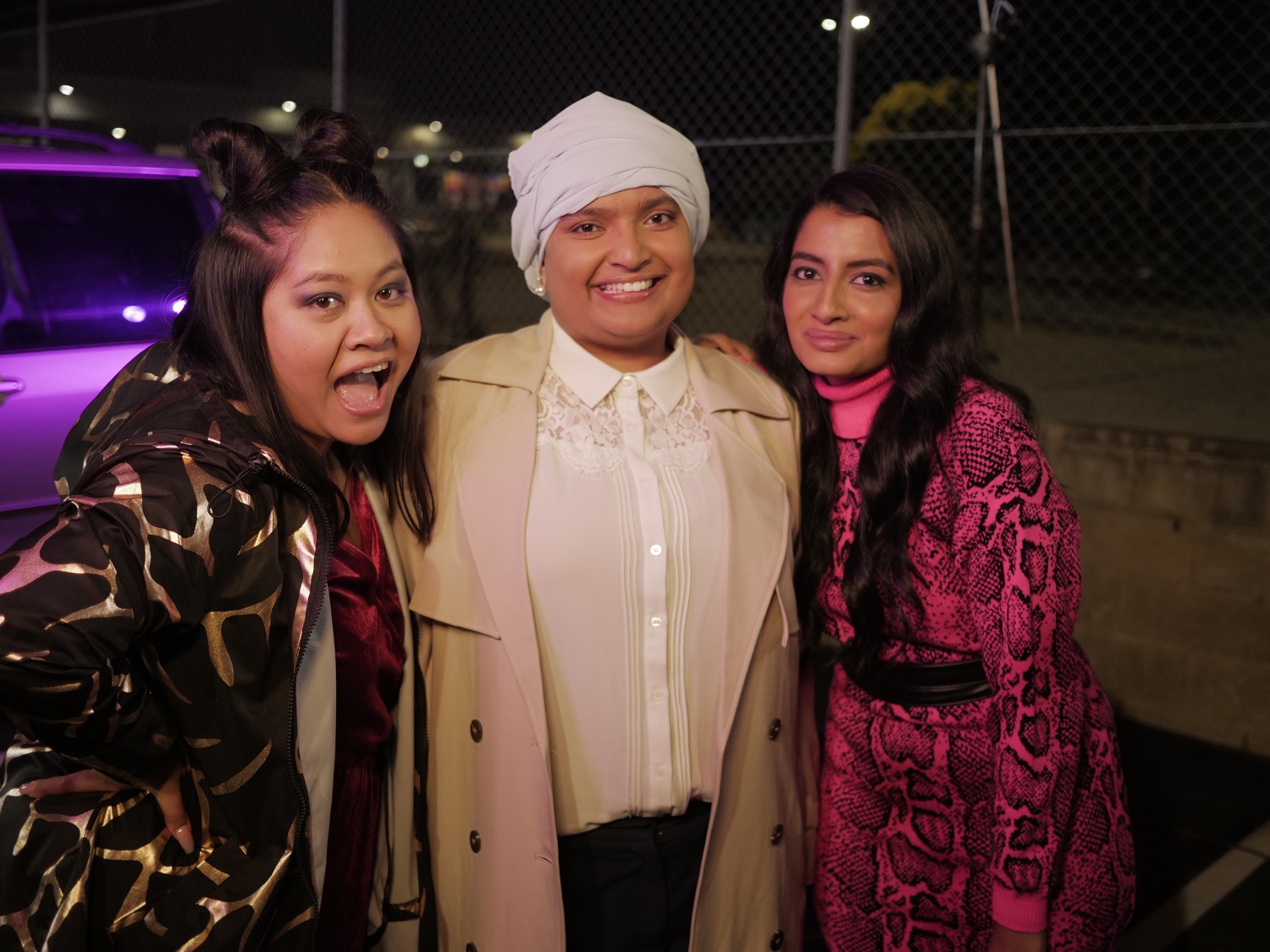
Main actresses in Carpark Clubbing: Sophea Op, Monica Kumar und Tasnim Hossain © Carpark Clubbing
die Seriale: Is the show inspired by the real circumstances in Western Sydney?
Tasnim Hossain: The show is very much inspired by the real circumstances in Western Sydney. It’s a vibrant, and often overlooked or misunderstood, part of Sydney that is full of fascinating stories and people. Having grown up elsewhere, I feel privileged to have been invited by the other creators to be a part of telling this story.
Sophea Op: “Carpark Clubbing” is based on specific physical parameters such as access to public transport, housing opportunities, and public infrastructure which 100% impacts the characters, but I also think in every friend group, we all know a Sokhey, recognise the Nashrah in the pack, and admire a Bonita. The most interesting and testing friendships are usually formed by chance in the most unsuspecting places. Carparks happen to be one of the most fertile places for such bonds to form in Western Sydney.
die Seriale: The series could end right after the end of the fourth episode without leaving the audience feeling like they are missing out on something. Is there a plan for a second season?
Sophea Op: We are incredibly proud of _Carpark Clubbing_ and if there is an opportunity to keep telling the stories of women from south-west Sydney, I hope the show continues to find a home in the hearts of doughnut loving uni students wherever they might reside.
die Seriale: Many thanks for the interesting interview!
Interview: Melina Hablitzl
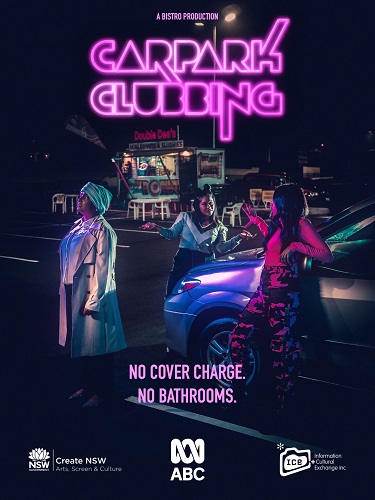
Poster Carpark Clubbing © Carpark Clubbing
Carpark Clubbing (2019)
Country: Australia
Genre: Comedy
Runtime: 4 x 8 min
Director: Sarah Bassuioni
Writer: Sophea Op, Tasnim Hossain, Monica Kumar
Producer: Elliot Clifford
Cast: Sophea Op, Tasnim Hossain, Monica Kumar
